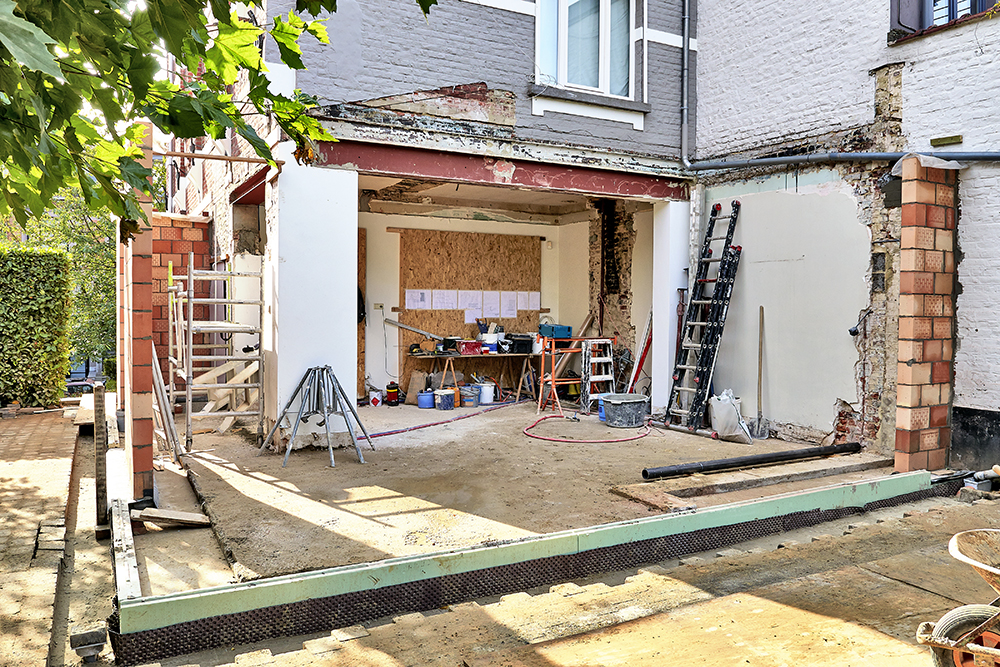Brexit: will home renovators count the cost?

One in three building contractors are feeling the impact of Brexit but what effect will it have on UK property owners looking to improve their home?
Builders say that Brexit will increase the price of major home improvements, as they will struggle to find enough skilled workers to complete the work. Bad news for homeowners who are embracing the 'don't move, improve' philosophy in a slowing property market.
New research shows there are concerns amid the construction industry that Brexit will have a negative impact on the employment of both skilled and unskilled workers from the EU, which could push prices up – a hike that could be passed on to homeowners.
- A third of builders are concerned about Brexit
- 37% of skilled workers in construction are non-UK
- Rising insurance costs to be passed on to homeowners
- Building materials expected to cost 3%-4% more per year
A Green Paper by The Construction Industry Training Board (CITB), published on 9 July, builds on research from 2017 that looked into migrant workers in the construction industry.
It found that one in three construction employers are feeling the impact of Brexit, up 9% from last year, and almost half of those surveyed said they felt employing migrant workers would become more difficult over the next two years.
This could cause problems for the building industry since almost two-fifths of employers (37%) employ non-UK workers directly or indirectly and the overriding reason given for using non-UK workers is to fill skills shortages.
Figures from 2015 show there are 122,094 construction workers in the UK who were born in other EU states, which represents around 45% of the industry’s total migrant workforce.
Commenting on the Green Paper, Steve Radley, Policy Director at CITB, said: "With Brexit approaching, construction employers are expecting the recruitment of skilled workers to get harder as they anticipate restrictions on access to migrant workers. However, few employers are making firm plans to address this and instead are focusing on retaining their existing migrant workforce.
"This Green Paper highlights the need for a twin-track strategy - investing in the domestic workforce while enabling employers to continue to secure the vital talent of migrant workers. With an estimated 158,000 construction jobs to be created between now and 2022, it is critical that the industry works together to deliver its part of this strategy.”
Will homeowners pay the price for Brexit?
The concerns raised in the CITB’s green paper are echoed elsewhere in the industry.
Research from Constructioninsure.co.uk suggests that a drop in skilled workers could lead to a rise in insurance costs across the industry – a cost that could be passed on to homeowners when it comes to getting extensions or other major works done.
Mark Herbert of Constuctioninsure says: “What many in the industry fail to realise though is that such an event [drop in skilled workers from the EU] would also have huge ramifications for their insurance costs as providers’ factor in the increased risks such a skills gap would present.
“This is likely to lead to a significant increase in the premiums construction companies must pay to protect their work. It’s a cost which many may have failed to factor into their Brexit planning yet it could increase the burden considerably.
“These increased costs will ultimately have to be met by consumers although some firms may find it difficult to cover the costs of both increased insurance policies and recruit and train new workers at the same time.”
How much more can we expect to pay for building and extensions post-Brexit?

The latest figures from the Building Cost Information Service (BCIS) for 2017 show that the standard price for a single storey extension of 3m x 4m costs around £19,000 before any profits or overheads are added. In reality, prices start around £25,000 for a project of this size.
While indications are there that we may see a rise in the cost of home extensions it is difficult to say at this stage by how much. However, research from BICS shows that the cost of materials rose significantly in 2017 – driven in part by the fall in Sterling exchange rates – and it anticipates that we can expect to see these costs continue to rise by 3%-4%
per annum.
Brexit – plan now to prevent fallout
Not everyone paints a bleak post-Brexit picture, though.
David Jacobs, co-founder of online estate agents Yopa, believes the situation is unlikely to be as dire as some would have us believe.
Jacobs says: “Brexit, and more specifically the impact it will have on the UK housing market, is an area of considerable uncertainty. However, with citizens’ rights now agreed between the EU and UK, it seems unlikely that the UK will see an exodus of construction specialists in the short term. In regards to the longer term prospects for attracting overseas construction specialists, this will ultimately depend on the UK's post-Brexit immigration policy.”
Jacobs says: “Prices [for extensions] can vary significantly between projects but expect to pay between £1,250 and £2,200 per square metre (depending on the quality and complexity of the extension). The impact that Brexit will have on these prices is not quantifiable at present due to the sheer scale of variables that would need to be taken into consideration, such as fluctuations in Sterling, the increase or decrease in the price of raw materials, overall house price fluctuations, availability of skilled workers etc.”
Comments
Be the first to comment
Do you want to comment on this article? You need to be signed in for this feature